Figs, with their sweet taste and unique texture, are not just delicious but also packed with numerous health benefits. Whether fresh or dried, figs offer a wealth of nutrients that contribute to overall well-being. Here’s a comprehensive look at why figs should be a staple in your diet for optimal health.

Nutritional Profile of Figs
Figs are rich in essential nutrients, including:
- Vitamins: Vitamin A, Vitamin B1, Vitamin B2, Vitamin B6, Vitamin K
- Minerals: Calcium, Iron, Magnesium, Potassium, Zinc
- Fiber: High in dietary fiber, aiding digestion
- Antioxidants: Polyphenols and flavonoids that combat oxidative stress
Health Benefits of Figs
1. Promotes Digestive Health
Figs are known for their high fiber content, which aids in promoting regular bowel movements and preventing constipation. The prebiotics in figs also support the growth of beneficial gut bacteria, enhancing overall digestive health.
Example: Including a handful of dried figs in your breakfast can help maintain a healthy digestive system.
2. Supports Heart Health
The potassium and magnesium in figs help regulate blood pressure and maintain heart health. The antioxidants in figs reduce the risk of heart disease by preventing the oxidation of bad cholesterol.
Example: Adding fresh figs to your salads or yogurt can provide a heart-healthy boost.
3. Strengthens Bones
Figs are an excellent source of calcium and phosphorus, which are crucial for bone health. Regular consumption of figs can help strengthen bones and prevent conditions like osteoporosis.
Example: A fig smoothie with almond milk and spinach can be a nutritious way to support bone health.
4. Aids in Weight Management
Despite their sweetness, figs can be a part of a weight management diet due to their high fiber content, which promotes a feeling of fullness and reduces overall calorie intake.
Example: Snacking on figs instead of high-calorie junk food can help control weight effectively.
5. Improves Skin Health
The antioxidants and vitamins in figs, particularly vitamin C and vitamin E, contribute to healthy skin by combating free radicals and promoting collagen production.
Example: A face mask made from mashed figs and honey can help hydrate and rejuvenate the skin.
6. Boosts Immune System
Figs are rich in vitamins and minerals that boost the immune system. Vitamin A and vitamin C, in particular, play a crucial role in maintaining immune function and protecting against infections.
Example: A fig and berry smoothie can provide a potent dose of immune-boosting nutrients.
7. Regulates Blood Sugar Levels
The high fiber content in figs can help regulate blood sugar levels by slowing down the absorption of sugar into the bloodstream. This makes figs a good fruit choice for people with diabetes.
Example: Incorporating figs into your diet, like adding them to oatmeal, can help manage blood sugar levels.
How to Incorporate Figs into Your Diet
Figs can be enjoyed in various ways, both fresh and dried:
- Fresh: Add sliced figs to salads, yogurt, or eat them as a snack.
- Dried: Use dried figs in baking, as a topping for cereals, or mix them into trail mixes.
- Smoothies: Blend figs with other fruits and vegetables for a nutritious smoothie.
- Cooking: Use figs in savory dishes, such as pairing them with cheese or adding them to meat dishes for a touch of sweetness.
Conclusion
Figs are a versatile and nutritious fruit that can contribute significantly to overall health. Their impressive nutritional profile and myriad of health benefits make them a valuable addition to any diet. Whether you enjoy them fresh or dried, incorporating figs into your daily routine can help you maintain a healthy body and improve your overall well-being. So, indulge in this natural delicacy and reap the health benefits it offers.


